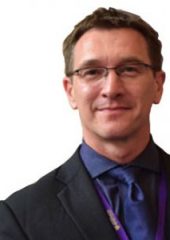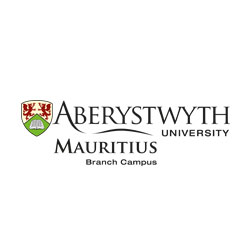In conversation with
Dr David Poyton
Dean | Aberystwyth University (Mauritius Branch Campus)

FDI Spotlight: Given your professional experience, what was it that led you to accept the challenge of coming to Mauritius and starting a branch university from scratch?
Dr David Poyton: Personally, when the opportunity arose it was a case of “Absolutely, why not? When would you get this chance again?” You have to seize these unique opportunities. If you do not take on new challenges, how will you grow?
When you arrive in Mauritius, your first thought is, “wow”. It really is a stunningly beautiful country. After spending some time here, I could see the potential for Mauritius to become a significant education hub for the region. As we have seen elsewhere, achieving that goal will take some time but I was very keen to play a part, albeit only a small one, in the attainment of that goal.
How many students do you have enrolled at the moment?
Dr David Poyton: We have about 55 at the moment. But we have only just begun of course. We have two intakes a year, October and March. We believe that the March intake will suit many students in Mauritius and overseas, where the education cycle finishes between December and February. In the UK our system is very focussed on an August results cycle. We thought that a two intake, three semester approach would be more fitting for the branch campus. It will take time for our student numbers to grow, but with a highly qualified resident international faculty, and being the highest ranked UK University campus on the Island, we are confident that students and parents desire the quality we offer.
After visiting other countries, why did the university finally decide on Mauritius?
Dr David Poyton: The University’s strategy includes the goal of ‘engaging the world’. A wide range of activities are being undertaken and the branch campus is one of the most ambitious. The world is changing, the education environment is changing, and mobility is key. ‘Mobility’ is no longer simply about students coming to us in the UK, it is about UK universities going out into the world and engaging in new and innovative ways.
With that strategy as a driving force, the University was looking at a number of options. At the same time, in Mauritius, the Board of Investment was engaging in activities aimed at attracting high quality tertiary education providers to the island. The two objectives coincided and with the introduction of a prospective private partner, the project was born.
What do you think of the growing interest from, mainly British universities in entering Mauritius?
Dr David Poyton: I think that many in the UK HE sector have similar strategic goals to our own and it is great to see the UK so well represented. We all have slightly different approaches to our internationalisation though. It is very important that the activities undertaken by us contribute to the development of the sector and the economy, in Mauritius.
As a branch campus, we believe that our mode of delivery distinguishes us. We must ensure that students have an outstanding learning experience; we are ranked 4th in the UK for student experience. To deliver this in Mauritius we are employing highly qualified, international faculty, working closely with colleagues at the home campus, to assure that the student experience is first class.
What are the challenges for Mauritius to become an educational hub for Eastern and Southern Africa?
Dr David Poyton: I genuinely believe that Mauritius can become an education hub, for Africa and beyond. To achieve this and for it to be sustainable, the critical foundation must be ‘quality’. To deliver this, financial and political investment, from government, universities and the private sector, is required.
By ensuring a high quality student experience and producing employable graduates, the sector in Mauritius will build a strong reputation, and trust and confidence in it will grow at home and overseas.
A key challenge is to facilitate an equal and open market for the sector, to attract quality providers in order to foster healthy competition and drive up standards. If Mauritius wants students from overseas to come, it needs to be able to say, “Here are a range of world-class institutions and facilities for you to choose from.” If you look at successful models, like Malaysia or Dubai, there are a number of strategies available to create an attractive environment, from a financial and practical perspective.
That said, it is important to be conscious of the fact that Mauritius is already home to some excellent public universities. Overseas providers need to collaborate with them on research and teaching-related projects, sharing knowledge and experience, in order to contribute to the development and enhancement of the education hub.
Where do you see Aberystwyth’s position in the university market in Mauritius in five years?
Dr David Poyton: Ours is a simple goal: to be the leading, or at least one of the leading providers of higher education in Mauritius and in the region. Our strategies, goals and aspirations, all relate to that aim. We will offer the best in student experience and graduate employability. We will produce high quality research outputs, with collaboration between public and private sectors, education and industry. But most of all, we will be recognised as being ‘Aberystwyth University’ and everything that is associated with the great name. As a result, we hope that Aberystwyth University will make as significant a contribution to Mauritian society and its economy as it has done in Wales.
